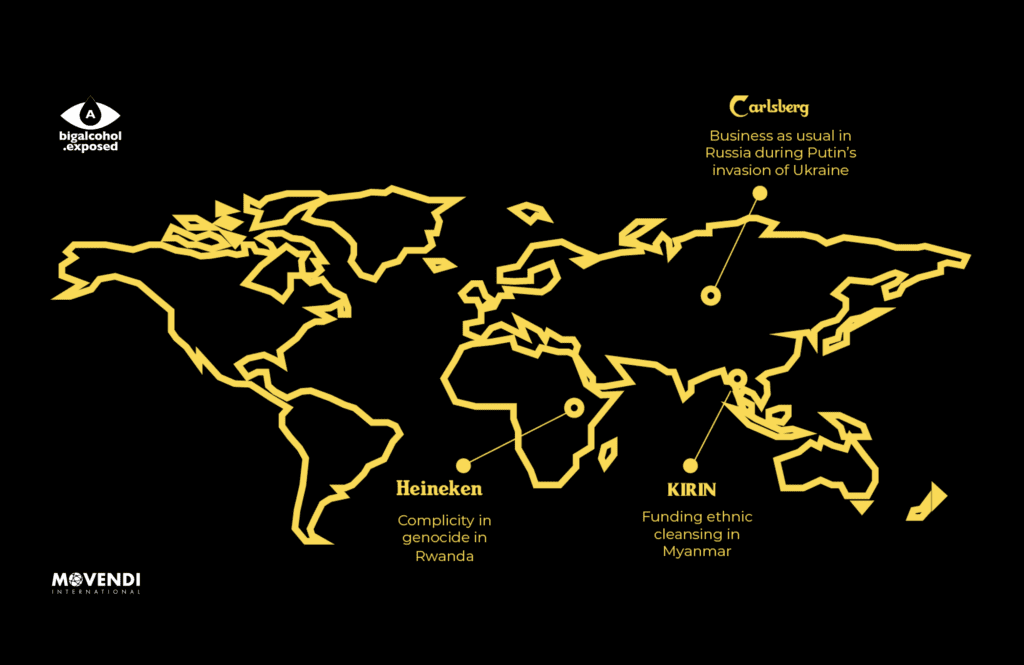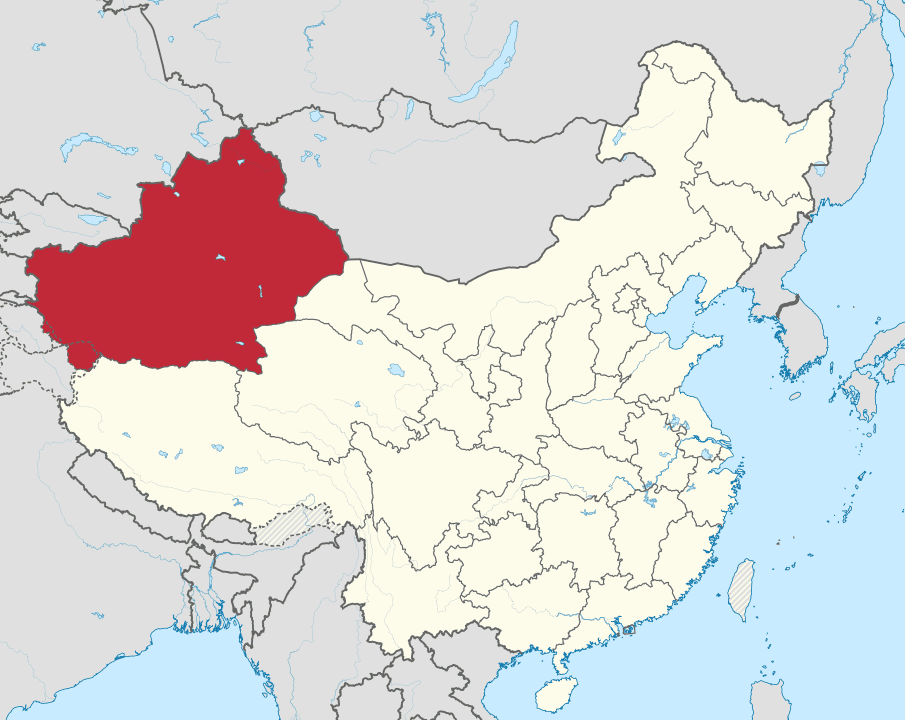Xinjiang is officially known as the Xinjiang Uygur Autonomous Region. It is an autonomous region of the People’s Republic of China (PRC), located in the northwest of the country at the crossroads of Central Asia and East Asia. Xinjiang is the largest province-level division of China by area and the 8th-largest country subdivision in the world. It has about 25 million inhabitants and is home to a number of ethnic groups, including the Uyghurs, Kazakhs, Kyrgyz, the Han Chinese, Tibetans, Hui, Chinese Tajiks (Pamiris), Mongols, Russians and Sibe, according to Wikipedia.
The major religion in Xinjiang is Islam, practiced largely by Uyghurs and the Hui Chinese minority. A demographic analysis in 2010 showed that Muslims formed 58% of the province’s population. Other major religions are Chinese folk religions, Confucianism, Taoism and Buddhism, practiced essentially by the Han Chinese, according to Wikipedia.
China has been accused of committing crimes against humanity and possibly genocide against the Uyghur population and other mostly-Muslim ethnic groups in the north-western region of Xinjiang.
Human rights groups believe China has detained more than one million Uyghurs against their will over the past years in a large network of what the state calls “re-education camps”, and sentenced hundreds of thousands to prison terms.
A series of police files obtained by the BBC in 2022 has revealed details of China’s use of these camps and described the routine use of armed officers and the existence of a shoot-to-kill policy for those trying to escape.
The US is among several countries to have previously accused China of committing genocide in Xinjiang. The leading human rights groups Amnesty and Human Rights Watch have published reports accusing China of crimes against humanity, according to BBC reporting.
Carlsberg: Profit over human rights
Beer giant Carlsberg owns the brand Wusu beer since 2015. In total, the Carlsberg owns five breweries in Xinjiang province, where the Chinese regime oppresses the indigenous Uyghur population through concentration camps, surveillance and hard-line assimilation campaigns, according to Sydsvenskan.
Testimonies from the province reveal that alcohol plays an important role in he oppression of the Uyghur population. If people consume alcohol, they go free. If people do not consume alcohol it is understood as “choosing Islam” and people can pay a high price for this.
Drink alcohol or end up in prison. This is the choice that many Uyghurs have faced since the 2010s.
The pressure comes from the Chinese government, which for the past decade has thrown people from the Muslim minority into internment camps, subjected them to forced sterilization, and mass-surveilled them because of their culture and faith, as per Danwatch reporting.
Leaks and testimonies show that alcohol has played an important role.
In roughly the same period, from 2015 onwards, the Danish brewing giant Carlsberg, through their local beer brand Wusu Beer, has been doing business in the same province.
It means that the Danish alcohol giant has made its products available in the Chinese government’s suppression of approximately 12 million Uyghurs living in Xinjiang.
The revelations are based on extensive research of open Chinese media, leaked documents and testimonies of escaped Uyghurs, which Danwatch has carried out in collaboration with TV2.
Experts criticize, among other issues, that Carlsberg is helping to sponsor a beer festival in a province where most people adhere to religions that promote a life free from alcohol and other drugs. So, in Xinjiang alcohol is used as a marker to assess whether people are “radical fundamentalists” or not.
Carlsberg has made itself a tool for the Chinese government in their repression in Xinjiang”, says Rune Steenberg, who is one of Europe’s leading Uyghur researchers and, among other things, has lived, researched and done anthropological fieldwork in Xinjiang, as per Danwatch.
Rune Steenberg, one of Europe’s leading Uyghur researchers
Carlsberg will not speak to Danwatch. In an email reply, Carlsberg’s communications director writes that Wusu’s role is “limited to sponsorship, including the delivery of taste samples, advertising and sales of beer during the festival”.
Carlsberg’s communications director writes that it is also not documented that their sponsorship of the beer festival helps “to suppress the original Uyghur culture”.
Wusu Beer festival
For the past eight years, Carlsberg has owned five breweries in Xinjiang province, which is considered one of the most controversial and closed places in the world.
One of the breweries is located in Wusu town, which holds the Wusu Beer Festival every year, as per Danwatch.
Wusu Beer Festival is an event that takes place every year with concerts and various stunts. The Carlsberg-owned brand’s logo can be seen everywhere, along with traditional Uyghur dance and folk costumes.
It is provocative and disrespectful. It is comparable to a Danish slaughterhouse doing a bacon commercial with Orthodox Jews dancing and munching on pork in Israel,” says Rune Steenberg, according to Sydsvenskan.
Rune Steenberg, one of Europe’s leading Uyghur researchers
But as with everything else in Xinjiang, this kind of festival must be seen in the context in which it is held, explains anthropologist Adrian Zenz, who helped leak “Xinjiang Police Files” that revealed the Chinese state’s repression of the province’s Uyghurs.
An activity like a beer festival is designed to move people away from their religion, rules and way of life”, says Adrian Zenz.
Adrian Zenz, helped leak “Xinjiang Police Files”
A limited amount of data, which Danwatch has gained access to, reveals people who were detained between 2010-2018 in a sub-region of Xinjiang had been placed in concentration camps, among other reasons, because they did not consume alcohol.
China itself has consistently called all accusations “the lie of the century”. Instead, the Communist Party claims they were fighting religious extremism and poverty in the mainly Muslim province.
In practice, this has led to Muslim culture and lifestyle in a province where more than half profess Islam, practically being made illegal, explains Adrian Zenz, as per Danwatch.
If Islam says you must not drink [alcohol] or eat pork, then the state will make people do exactly that to allegedly fight religious extremism”, says Adrian Zenz.
Adrian Zenz, helped leak “Xinjiang Police Files”
Uyghurs now live with the knowledge that they may risk being sent to an internment camp if they refuse to participate in events that the state expects of them.
[People] know they can be labeled as religious extremists. This is how the system works. It is a police state”, says Adrian Zenz, as per Danwatch.
Adrian Zenz, helped leak “Xinjiang Police Files”
Leaked documents, testimonies from escaped Uighurs, and Chinese media confirm the same story: Uighurs have been largely detained or thrown into prison for growing a slightly too long beard, for praying, for fasting and not least: for not wanting to consume alcohol.
And alcohol in particular has played a major role in China’s criminalization of Islam in Xinjiang, says anthropologist Rune Steenberg, according to Danwatch.
Alcohol has undoubtedly been an active tool in the oppression of the Uyghurs. Especially in creating a situation where you have not been able to remain Uyghur in any strong sense without being labeled as an Islamist or a radical fundamentalist”, says Rune Steenberg
An extract from a leaked dataset of people detained from the 2010s up to 2018 in the Konasheher area of Xinjiang, which Danwatch and TV2 have been given exclusive access to by Adrian Zenz, illustrates the role of alcohol in the province.
The dataset, which covers only a fraction of all detainees in Xinjiang, shows that 175 people were in detention camps on the grounds that, among other reasons, they did not consume alcohol – in Xinjiang that means Carlsberg’s products and brands.
Big Alcohol practices violate Human Rights

Other alcohol giants have also been exposed for unethical corporate practices that put profit maximization over fundamental human rights.
Alcohol giant Kirin funds ethnic cleansing in Myanmar
In 2018, Movendi International brought wide attention to an Amnesty International investigation that exposed beer giant Kirin’s partnership with the military regime in Myanmar. Kirin held majority stakes in Myanmar Brewery (51%) and Mandalay Brewery (51%), which are co-owned by Myanmar Economic Holdings Public Company Limited (MEHL). MEHL is a military owned conglomerate and serves as a welfare fund for the military.
Through its joint ventures, Kirin was legitimizing and funding the Myanmar military as it faced charges of genocide at the International Court of Justice.
Moreover, Kirin’s subsidiary in Myanmar made three donations to the Burmese military during the army’s offensive in 2017 that forced over 700,000 Rohingya civilians to flee to neighboring Bangladesh. United Nations investigators concluded that this operation included mass killings and gang rapes and was executed with “genocidal intent”.
The people of Myanmar had been boycotting Myanmar Beer over its support for the military regime. Myanmar Beer is made by Myanmar Brewery which is jointly owned by Kirin Company and the Myanmar Economic Holdings Limited (MEHL).
In early 2021, Movendi International, Amnesty International, other civil society and the global community succeeded in mounting public pressure and scrutiny towards ending the partnership between Japanese owned Kirin and the military regime in Myanmar. The Big Alcohol giant had invested in the military regime over many years, even amidst ethnic cleansing campaigns and grossly put profit interest over people.
Later that year, Norway’s biggest sovereign wealth fund – the largest in the world formally – called “Government Pension Fund Global” put Kirin on a watch list due to Kirin’s connection to Myanmar’s military regime.
Another example of Big Alcohol putting profit maximization over human rights is Heineken in Russia.
Heineken continues investing in Russia as country wages war on Ukraine
Despite the promise to stop investing in Russia as a consequence of Russia’s invasion of Ukraine, Heineken launched no less than 61 new products on the Russian market in 2022, according to an investigation by Olivier van Beemen.
Heineken’s practices in Russia and the beer giant’s support for Putin’s regime are part of an appalling track record of unethical business practices.
Heineken’s track record
After six years of research, journalist Olivier van Beemen provided a detailed investigation into the predatory practices of Heineken in the book “Heineken in Africa. A Multinational Unleashed“. The truth he uncovered: Heineken is exploiting people, communities and countries in Africa. The book details a shocking list of unethical practices employed by the world’s second largest beer producer:
- Support for apartheid
- Complicity in genocide
- Support for authoritarian regimes and collaboration with rebel groups
- Corruption
- Tax avoidance
- Aggressive political lobbying to obstruct, derail and undermine public health policy making
- Unethical alcohol marketing, like beer promotion in schools
- The beer promotional girls scheme, running for almost two decades
- Exploitation of young women
- Sexual abuse
- Serious problems with protecting worker’s rights
- Severe issues with ensuring adequate workplace safety
- Misinformation about alcohol’s effects
- Fuelling stereotypes about Africa
